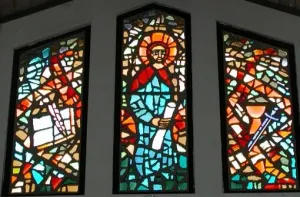 This is the ninth installment of my continuing recap/summary over James Dunn’s newest volume Neither Jew nor Greek. In this section I will cover his section entitled ‘Eusebius and the Heresiologists’ (40.3). Dunn offers this section in part due to the fact that the Christian movement begins to see a change from a plethora of apologists to a group of heresiologists (‘heresy scribes/hunters’). This particular time period is “a decisive tipping point in Christianity’s history and the point at which this study concludes.” Dunn also carefully notes that the relaibility of historical information on these six figures is shaky and often uncertain at points, but they do shed some light on what was taking place during the second century CE. In this post I will follow Dunn’s order of the six figured covered, which also follow a chronological ordering.
This is the ninth installment of my continuing recap/summary over James Dunn’s newest volume Neither Jew nor Greek. In this section I will cover his section entitled ‘Eusebius and the Heresiologists’ (40.3). Dunn offers this section in part due to the fact that the Christian movement begins to see a change from a plethora of apologists to a group of heresiologists (‘heresy scribes/hunters’). This particular time period is “a decisive tipping point in Christianity’s history and the point at which this study concludes.” Dunn also carefully notes that the relaibility of historical information on these six figures is shaky and often uncertain at points, but they do shed some light on what was taking place during the second century CE. In this post I will follow Dunn’s order of the six figured covered, which also follow a chronological ordering.
Hegesippus
-Eusebius notes that Hegesippus belongs in the generation after the apostles (HE 2.23.3)
-A Jewish convert
-Wrote five treatises
-Discusses a variety of heresies, some of which he attributes to arguments over the successors in the Jerusalem church after the death of James (HE 4.22.3-6)
Irenaeus
-Dunn indicates that Irenaeus could be categorized as the last of the apologists, but his most significant literary contribution was the five books Against Heresies
-Lived fully within the second century CE (c. 130-200)
-Bridged the gap between the east and the west, having grown up in Smyrna but eventually serving as bishop of Lyons in 178 CE
-Argued against a variety of forms of Gnosticism, particularly belonging to Valentinius
-Argued that there should only be four Gospels
Tertullian
-Born around 160 and raised in Carthage
-Converted to Christianity some time before 197 CE
-Polemizes all heresy
-Regards the true church as evidently the result of successions of episcopal leaders who alone possess the authority to interpret Scripture
-Penned five books against Marcion
-Leaned toward Montanism, resulting in a hit to his reputation
Hippolytus
-Lived from around 170-236 CE
-Was an active teacher in Rome in the early third century CE
-His primary writing was Refutatio Omnium Haeresium (‘Refutation of All Heresies’)
Eusebius
-Served as bishop of Caesarea from c. 260-340 CE
-Was a supporter of Arius (the primary opponent of Nicene christology)
-Likely gave an “unwilling assent” to the Nicene Creed
-His ten volume Ecclesiastical History is significantly faulted by its perspective of the ‘winners’ in the Constantinian settlement
Epiphanius
-Served as bishop of Salamis (c. 315-403)
-Noted as an uncritical upholder of the Nicene Creed
-His principle writing Adversus Haereses describes and attempts to refute some eighty religious sects, beginning from Adam on down into his own time
-Argues that Judaism itself is a heresy
-Makes note of the Gospel of the Ebionites and the Gospel according to the Hebrews
Subscribe for further installments of my recap/summery of James Dunn’s Neither Jew nor Greek.
